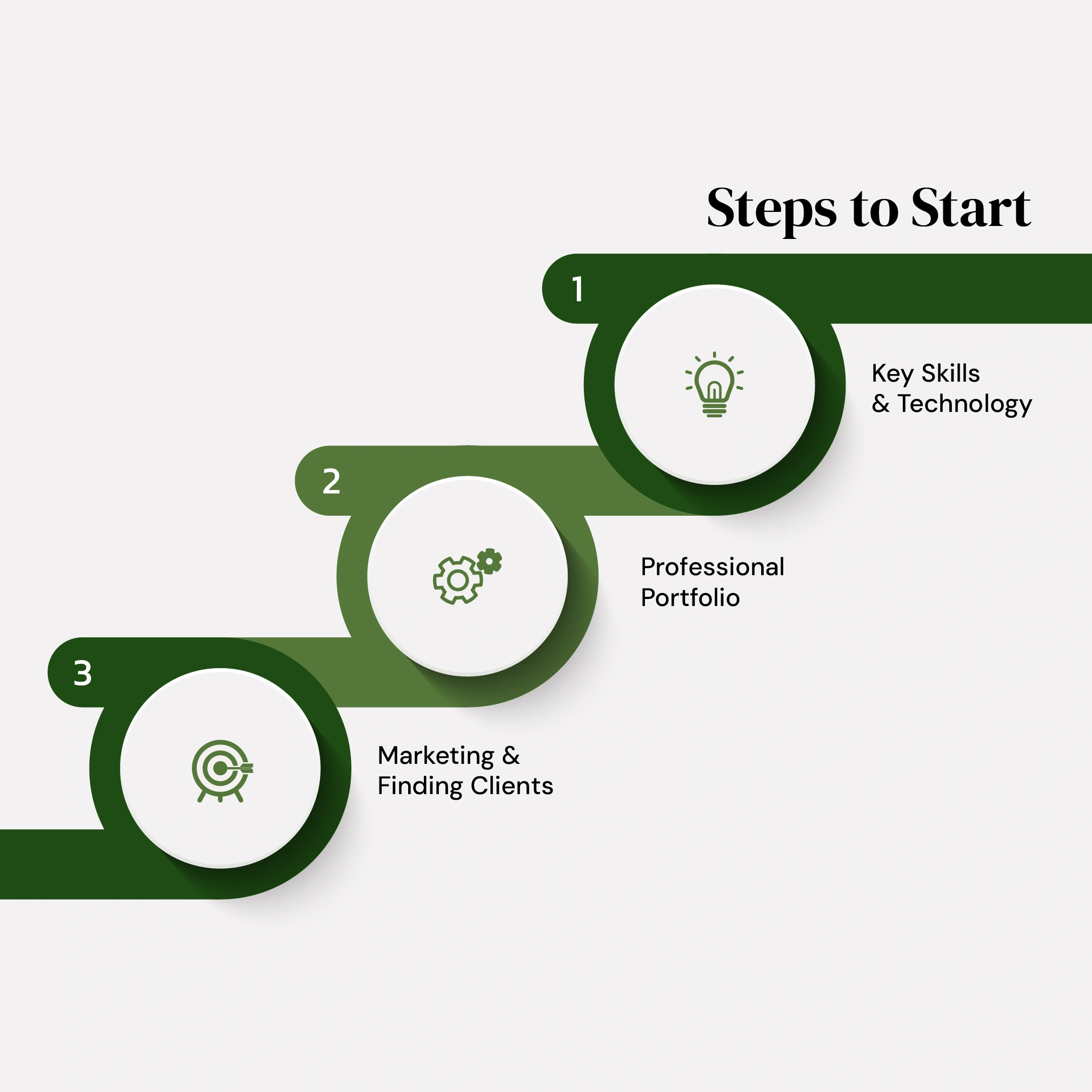The world of virtual assistance has grown a lot. It used to mean a remote worker giving administrative support to executives or business owners. Now, it includes a wider range of services.
More professionals and small businesses need virtual assistants. Some need specific skills, like those of a real estate virtual assistant. In this detailed blog post, we will discuss how to become a real estate virtual assistant and guide you to become a REVA.
Understanding the Role of a Real Estate Virtual Assistant
Many real estate agents prefer to work alone. But as the business grows, it’s smart to delegate some tasks to a skilled virtual assistant. This is where real estate virtual assistants can help.
What is a Real Estate Virtual Assistant?
A real estate virtual assistant helps property agents, brokers, investors, property management firms, and telemarketers with their tasks from a remote location. This role lets you experience the real estate field without the expense of getting a realtor’s license. These professionals hire a real estate VA because they don’t want to keep doing repetitive tasks.
Key Responsibilities of a Real Estate VA
A Real Estate VA has many key responsibilities. One of the key responsibilities is keeping everything organised, from scheduling appointments to sending out reminders. But that’s just the beginning.
Another task that can come to a REVA is social media content management. Most real estate agents need to post multiple times on social media, which takes too much time. So, it is very important for a real estate virtual assistant to handle their social media.
Lead generation can take a lot of time for a real estate professional, which is why most smart professionals hire a real estate virtual assistant. So, we can say it is a mandatory task for a property va.
For transaction details, remote assistant ensures everything is in order. They have to be very professional in handling paperwork, tracking progress, and meeting deadlines.
But there’s more. Real Estate VAs also manage databases, keeping them current to support smooth business operations.
So overall, the specific tasks may vary, but these are the core duties of a Real Estate VA.
If you want to know a few specific tasks or responsibilities, you can read these blogs also:
- Top 12 Tasks Lettings Agents Should Delegate to Virtual Assistants
- Tasks Estate Agents Should Delegate to Virtual Assistants
What Qualifications Are Needed to Become a Real Estate Virtual Assistant?
You don’t need a specific degree or certification to become a Real Estate VA. However, the right skills and experience can help a lot. Here’s what to focus on:
First, you must be tech-savvy. A reliable computer and strong internet connection are essential since most work is online. Be comfortable using different software. This includes basic office apps and special real estate tools.
Next, you must have good communication skills. Most of your work involves clients, agents, and other professionals, so you need to be super fast at writing clear emails and making professional phone calls. This means you need to be fluent in English, both in writing and speaking.
It’s not always necessary, but knowledge about real estate operations is a plus. Knowing key terms, regulatory processes, and operational procedures helps you simplify your work and create good client relationships.
Administrative skills are also necessary. Your work will include database management alongside appointment scheduling duties. Being detail-oriented and organised is an essential requirement.
The last requirement for being a successful REVA includes the ability to learn new things . Real estate business remains under continuous change. Being a REVA means staying updated on market trends and new technologies. Your unique place in the industry will come from taking initiative and being dedicated to growth.
What are the Steps to Start a Career as a Real Estate Virtual Assistant?

Step 1. Learn the key skills and technology used for real estate
Being a real estate virtual assistant requires specific knowledge and skills that are valuable to real estate professionals. You also need to be familiar with administrative tasks and other virtual assistant duties.
If you don’t have a real estate background, learn the key terms, industry practices, and software. You should also build communication, organisation, time management, and customer service skills.
One of our expert real estate virtual assistants shares the tools she uses daily:
- CRM: 10ninety
- Communication: Outlook, WhatsApp, Teams
- E-signing: EchoSign
- Deposits: DPS (Insured & Custodial)
- Licensing: Depends on local council
Step 2: Build a professional portfolio
Many clients ask for a portfolio before hiring a real estate virtual assistant. Don’t feel disqualified if you don’t have one. Instead, create a portfolio that shows your skills and experiences.
Include your education, real estate virtual assistant training, and certifications. Mention any past real estate or admin work. Also, highlight specific tasks or projects you completed successfully.
You can build your online portfolio with WordPress, Wix, or Squarespace. Make sure to add an about me page, services offered, testimonials, contact info, and a clear call-to-action for potential clients. We noticed that candidates with a portfolio website get hired faster than those without.
This is a must-have: use LinkedIn to network and showcase your professional profile. It will put your professionalism on top and make you an industry leader.
Step 3. Market yourself and find clients
Your professionally designed portfolio is ready, so now you must market yourself to secure clients. After creating an online presence with your website or portfolio, let potential clients know about you. According to Statista, there are approximately 62,400 estate agents working in the United Kingdom (as of the third quarter of 2024). But this is not the end. As of 2024, over 3 million people hold active real estate licenses in the United States.
So, there are endless possibilities for getting clients if you market yourself well.
Here is another thing you can do: You should search for virtual assistant directories or freelance platforms to build your profiles. Also, you can find and reach real estate pros through social media.
Tips for Success as a Real Estate Virtual Assistant
We interviewed some of our most professional virtual real estate assistants to give you some valuable tips. We hope these tips will come in handy when you enter the competition:
- Get comfortable with listing: Knowledge of listing creation allows virtual assistants to stand out from their competition. This will especially help you when you work for an Estate agent.
- Set clear work hours: When you work from home, it’s easy to blur the lines between work and personal time. Establishing a routine helps you stay focused and productive.
- Be proactive: Productivity means identifying the potential needs of your clients in advance, which will allow you to present solutions even when they do not express their requirements.
- Learn to speak “agent language”: One of our most experienced REVA said this: If you can not understand the daily challenges of a realtor, you can’t become a good VA. So, always be aware of new challenges and come up with solutions.
- Invest in relationship building: The relationship between a virtual assistant and their client is everything – I spend time each week just checking in personally.
- Network in online communities: I joined three Facebook groups for real estate VAs and found most of my clients there, not on job boards.
- Invest in continuous learning: The best real estate virtual assistants constantly improve their skills to become excellent real estate resources for their clients.
- Follow best practices: Adhere to industry best practices and maintain a high level of professionalism to become an excellent real estate virtual assistant.
Where to Find Virtual Assistant Jobs in the Real Estate Industry?
Here are a few networks where you can sign up that will match you with a client:
- Teambuild Consultancy.
- Time Etc Limited.
- Somewhere.
- Woodbows.
- Virtual Latinos.
- MyOutDesk.
- VBS Real Estate.
You can find remote work from home by searching a job board like these:
You can also sign up on a freelance platform and work remotely for multiple clients simultaneously. Here are some reputed freelance platforms:
Freelancer






